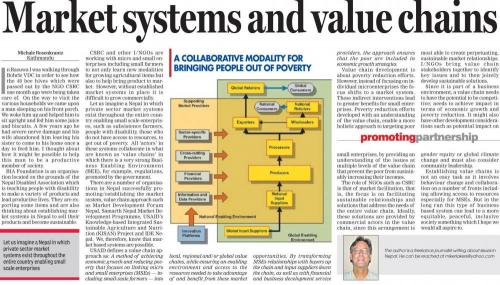
In Rasuwa I was walking through Bohrle VDC in order to see how the 48 bee hives which were passed out by the NGO CSRC one month ago were being taken care of. On the way to visit the various households we came upon a man sleeping on his front porch. We woke him up and helped him to sit upright as we wanted to feed him some juice and biscuits. A few years ago he had severe nerve damage and his wife abandoned him leaving his sister to come to his home once/day to feed him. I thought about how it might be possible to help this man to be a productive member of society.
BIA Foundation is an organization located on the grounds of the Nepal Disabled Association which is teaching people with disability how to make a variety of products and lead productive lives. They are exporting some items and are also thinking about how to establish market systems in Nepal to sell their products and become sustainable.
CSRC and other I/NGOs are working with micro and small enterprises including small farmers to not only learn new modalities for growing agricultural items but also to help bring product to market. However, without established market systems in place it is difficult to grow commercially.
Let’s imagine a Nepal in which private sector market systems exist throughout the entire country enabling small scale enterprises, such as subsistence farmers, people with disability, those who don’t have access to resources, to get out of poverty. All “actors” in these systems collaborate in what are known as “value chains” in which there is a very strong Business Enabling Environment (BEE), e.g. regulations, promoted by the Government.
There are a number of organisations in Nepal successfully promoting/establishing the market system, value chain approach such as Market Development Forum Nepal, Samarth Nepal Market Development Program, USAID's Knowledge-based Integrated Sustainable Agriculture and Nutrition (KISAN) Project and IDE Nepal. We therefore know that market based systems are possible.
US AID defines a value chain approach as: A method of achieving economic growth and reducing poverty that focuses on linking micro and small enterprises (MSEs)—including small-scale farmers—into local, regional and/or global value chains, while ensuring an enabling environment and access to the resources needed to take advantage of and benefit from these market opportunities. By transforming MSEs' relationships with buyers up the chain and input suppliers down the chain, as well as with financial and business development service providers, the approach ensures that the poor are included in economic growth strategies.
Value chain development is about poverty reduction efforts. However instead of focusing on individual microenterprises the focus shifts to a market system. These indirect interventions lead to greater benefits for small enterprises. Poverty reduction efforts developed with an understanding of the value chain, enable a more holistic approach to targeting poor small enterprises, by providing an understanding of the issues at multiple levels of the value chain that prevent the poor from sustainably increasing their incomes.
The role of NGOs such as CSRC is that of market facilitation, i.e. the focus is on facilitating sustainable relationships and solutions that address the needs of the entire value chain. Ideally, these solutions are provided by commercial actors in the value chain, since this arrangement is most able to create perpetuating, sustainable market relationships. I/NGOs bring value chain stakeholders together to identify key issues and to then jointly develop sustainable solutions.
Since it is part of a business environment a value chain needs to have the potential to be competitive, needs to achieve impact in terms of economic growth and poverty reduction, might also have other development considerations such as potential impact on gender equity or global climate change and must also consider community leadership.
Establishing value chains is not an easy task as it involves behavior change and collaboration on a number of fronts including allowing access to resources especially for MSEs. But in the long run this type of business based system can lead to a more equitable, peaceful, inclusive society something which I hope we would all aspire to.










Add new comment